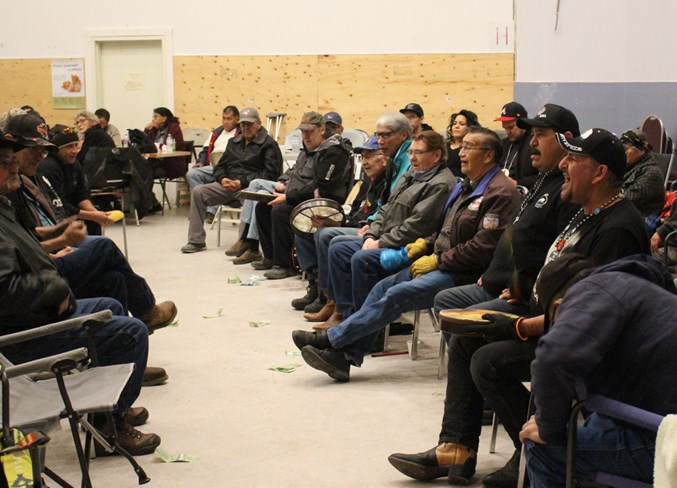“You play to have fun knowing that he’s here with us.”
William Dion said his son, Preston, loved to play handgame before he passed away at the age of 21 on Nov. 4, 2015 after a vehicle rollover. He also enjoyed cooking, spending time with his son, Keeson, and working with his father in the oil and gas industry while completing his high school credits.
For the last four years, family and friends have come together to honour his memory by participating in the Preston Billy-Joe Dion Memorial Handgame Tournament.
This year, dozens gathered at the Kehewin Cree Nation Rec Centre Nov. 28 to Dec. 1 to participate in the game that has groups competing to see who will come out the winner.
Preston’s mother, Besty Dion, described the event as a healing tournament for everyone who knew her son.
“We’re very lucky to have had this memorial,” she expressed. “I’m glad that I have the support of friends and family, and I’m very thankful for everyone.”
Participant Ray Scanie, member of Cold Lake First Nations, described handgame as a “universal game among aboriginal people throughout North America.”
The game begins with 11 sticks. The captains compete for who will get the kick stick, which determines the team that’s guessing and the one that’s hiding. The leader then distributes the bones. Some are striped and others are plain. The other team must guess how each person is holding their bones. There are various possibilities, for example, someone could be hiding a striped and plain bone in one hand, or one in each.
“The players start singing, and hiding the bones. The captain will get up with the 10 sticks, five in each hand, and will grab whichever five he wants,” explained Scanie.
The sticks are used as point counters. If someone guesses incorrectly, they must give one to their opponents. If a guess is correct, a stick is surrendered to the other team. The game ends when one team has all 10 sticks.
Organizer Florence Youngchief said, “My nephew (Preston) was a handgame player. I played with him, and took him to play handgame tournaments (all over). We went to different places to go play, and we always played together.”
Showing support for the family and playing a game he enjoys were among the reasons Scanie participated in the tournament.
“We enjoy ourselves, and we have a lot of fun. We play for competition, but at the end of the day, we all go home happy whether we win or lose because you get together with your friends,” he said.
Youngchief noted handgame is a “healing process because there’s a ceremony and lots of prayers involved.”
“You heal and grieve at the same time. We’re crying, but there’s a lot of joy because of the people that come out. A lot of people do it for fun, they travel a long ways to come and be with the family,” she continued.



